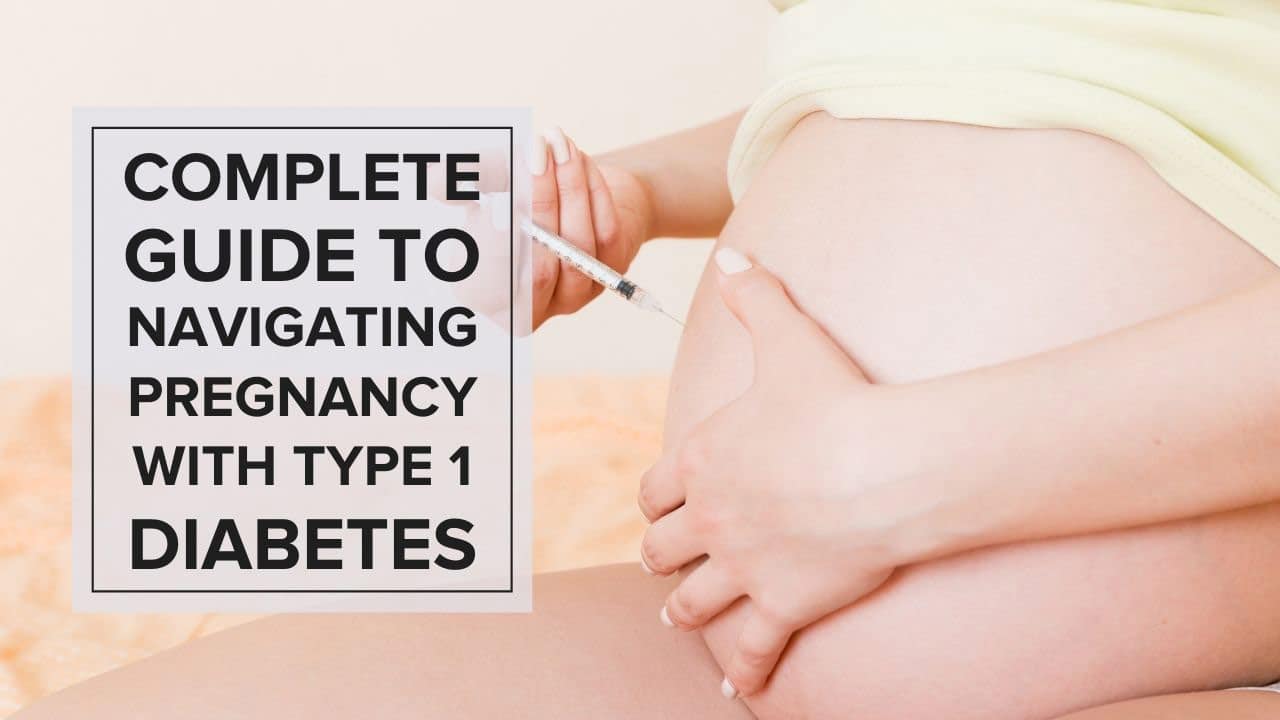
Can You Have A Healthy Pregnancy With Type 1 Diabetes?
The short answer? Yes! Thousands of mothers each year are able to safely manage their type 1 diabetes and blood glucose throughout conception and pregnancy to deliver a perfectly healthy baby.
However, there are a few more considerations you’ll have to keep in mind throughout the process.
In this article, we’ll review some of the risks and complications to be aware of, and explain how through a proper diet and healthy lifestyle, you can easily manage your pregnancy and transition into motherhood.
Pregnancy Risks for People with Type 1 Diabetes
About 10% of pregnant women in the US experience complications due to diabetes. However, only a small portion of this number (between 1 in 20 and 1 in 50 women with diabetes) experience these complications due to type 1 diabetes.
The studies have shown that women with type 1 diabetes are at an increased risk for some complications, but most of these risks can be drastically reduced by a personalized management plan and a healthy lifestyle.

Potential Complications With Type 1 Diabetes And Pregnancy
According to one comprehensive study, expecting mothers with type 1 diabetes are at an increased risk for:
This can be concerning to read at first. However, it’s worth noting that these complications are possible in any pregnancy, not just those in which mothers have type 1 diabetes, and improvements in pregnancy management have been shown to reduce these risks.
For example, another study found that careful management of type 1 diabetes complications like:
Can be a very effective treatment method to ensure a healthy pregnancy.
Type 1 Diabetes And Pregnancy Guidelines

The central complication to type 1 diabetes during pregnancy is the one that you’re already dealing with every day — blood glucose management (blood sugar management).
As your body changes during pregnancy, it’s possible that your A1c and blood glucose can experience a number of different fluctuations. This can happen simply due to adjusted caloric needs, a changing hormone balance, or due to mild complications like gestational diabetes.
However, these changes can all be handled by regular measurement of your blood glucose — through fingersticks or a continuous glucose monitor (GCM) — and insulin doses administered through your insulin pump, syringe, or pen.
We recommend speaking with your doctor about how your blood glucose and insulin needs might change during pregnancy, and keeping an eye on this and any other aspect of your health closely.
Below, we’ve included some general rules of thumb for each stage of your pregnancy. But remember, each person’s pregnancy is different, so the best chance of a healthy baby is to frequently check-in, work together with your care team, and stay informed!
Pre-pregnancy
Not every pregnancy is planned, but if you are able to think ahead, experts recommend taking a few months pre-pregnancy to focus on your blood glucose control.
The goal here is to reach an A1c of 6.0% or less, which is an excellent baseline that can help significantly reduce your risk of complications due to diabetes.
It’s also been documented that your insulin requirements will increase throughout pregnancy, which means that starting at a healthy, manageable A1c and insulin requirement will set you up for success later in your pregnancy.
The Final Word: If you have the chance, working on your blood glucose control (and any other health issues) prior to pregnancy can make a big difference.
First Trimester
As we mentioned, not every pregnancy is planned, so if you’ve been struggling with an A1c greater than 6.0% then it’s vital to work with your doctor to normalize your blood glucose as soon as you know that you’re pregnant.
Addressing this problem in early pregnancy (or before if possible) helps ensure that your child has a supply of healthy, well-regulated blood. Extra insulin, medical intervention, or dietary changes can all help you quickly gain control of your insulin again.
During the first trimester, you’ll also start to notice that your insulin requirements will start to change (up to 0.9 units of insulin per kg of body weight more). These changes can happen gradually or quickly depending on the person, so it’s important to be ready and prepared for this change.
This is also an important time to start screening for any other complications that might occur in your pregnancy. For women with preexisting diabetes, most diabetes-related complications show themselves early and can be dealt with by medical intervention if found on time.
The Final Word: Be prepared for some changes to your insulin requirements and routine, and start working with your doctor. With the help of your medical care team, you’ll be able to get ahead of any complications and start your pregnancy off right.
Second Trimester
During your second trimester, your insulin requirements can increase rapidly, even more rapidly than in your first trimester, so it’s important to be aware of this upcoming change and manage it carefully. Your doctor and diabetes care team can help you pick the right strategy.
Apart from monitoring your insulin, you should continue with frequent ultrasounds and checkups as recommended by your doctor.
Congenital anomalies at 16-18 weeks, and echocardiograms at 20-22 weeks are two areas that can affect women with diabetes more often, but these are another condition that can be handled through medical intervention if caught early.
The Final Word: If you stay on top of your management and checkup plan, you should be able to keep your insulin in check and catch any complications early.
Third Trimester
Once again, insulin requirements typically continue to increase as you reach your third trimester, and both your child and placenta continue to grow and require more nutrients. At this point, it’s important to continue your management plan and close communication with your doctor.
For women who haven’t been monitoring their pregnancy closely, this trimester is when complications can be most prominent and require the quickest intervention, so make sure to check in with your doctor as recommended.
However, if you have been working with your team closely, you should be informed about your child’s health and how to bring your pregnancy safely to a close. In most women with type 1 diabetes, labor tends to occur at around 40 weeks, just as with the average pregnancy.
The Final Word: Stay on top of your plan, stick with what’s been working, and continue to check in with your doctor. You’re almost to the finish line.
Delivery
As you get closer to your expected delivery date, take some time to check in with your doctor about a comprehensive plan for delivery, which should include all of the details of what to expect and do when your water breaks.
Having a plan in place to manage your insulin can be important for the day of delivery since your insulin requirements throughout labor can vary significantly due to the various different stresses on your body.
For example, most doctors recommend women avoid taking basal or long-acting insulin when in labor and instead allow doctors to apply intravenous insulin throughout delivery.
Cesarean (c-section) birth is not required significantly more often for women with type 1 diabetes, but this plan can usually be determined by your obstetrics team in the days leading up to your delivery.
The Final Word: Preparation is key for the last part of your pregnancy. You never know exactly when your child will be born, so all you can do is make sure you have a plan in place to execute.
Post-Partum
Your insulin requirements will typically see a significant decrease directly after birth since your body will no longer be taking in nutrients to sustain yourself and your child. In most cases, your insulin will actually end up close to pre-pregnancy levels.
During your child’s early development, you’ll also experience a significant reduction in insulin requirements if you’re breastfeeding, which is recommended for most new mothers with type 1 diabetes.
Most health care teams will recommend a number of follow-up checkups to make sure that both you and your baby are recovering well from the intense experience that childbirth brings. This can be an excellent time to check in about your insulin strategy, and what it means going forward.
The Final Word: Congratulations on completing an incredibly strenuous and beautiful part of life. Stay on top of your check-ups for the period immediately following birth, and you should be prepared for whatever comes next.
Type 1 Diabetes And Pregnancy Diet

Fortunately, most of the same principles of type 1 diabetes management and controlling your blood glucose levels are the same whether you’re pregnant or not: focus on a low-fat, plant-based, whole-food diet that’s high in natural carbohydrates.
Below, we go into some general guidelines about the best foods to eat and the foods to avoid during your pregnancy.
Green Light Foods
These foods are nothing but healthy for your body, especially during pregnancy, and contain some key nutrients like fiber, whole carbohydrates to help avoid hypoglycemia, antioxidants, and folic acid.
Feel free to eat as much of them as you like!
Fruits for breakfast and lunch (3-5 servings per meal).
Whole grains like quinoa, brown rice, steel-cut oats, barley, buckwheat, farro.
Legumes like beans, lentils, peas, chickpeas.
Vegetables of all kinds.
Herbs and spices.
Red Light Foods
Red light foods can have a wide variety of negative effects on your body during pregnancy.
In the best case, they can place a strain on your insulin requirements (which will already be increasing), while in the worst case (with foods like alcohol and caffeine) they can lead to serious complications for your baby.
Here’s a list of red light foods to try to stay away from.
Note: We know that pregnancy can be a difficult time, so don’t be too hard on yourself if you can’t adhere to these guidelines perfectly.
Still, following these guidelines is one of the best evidence-based, research-backed methods to ensure you’re eating the best diet for yourself and your baby!
Resources For Pregnant Women with Diabetes
If you’re starting to think long term about getting pregnant and want to get your blood glucose control first, you can find a library of resources as well as expert guidance through the team at Mastering Diabetes.
These diabetes educators are experts in the use of diet and lifestyle changes supported by the American Diabetes Association and expert endocrinologists everywhere to help you reduce your insulin requirements permanently.
And there’s no better time to start than when you’re getting ready for pregnancy!
Lower Your A1c and Get to Your Ideal Body Weight ... Guaranteed

Your results are guaranteed. Join more than 10,000 ecstatic members today
Personalized coaching puts you in immediate control of your diabetes health, helps you gain energy, improves your quality of life, and reduces or eliminates your meds.
However, if you’re already pregnant or looking to get pregnant soon, we recommend working with your healthcare and diabetes care teams together.
They may recommend some of the strategies we use at Mastering Diabetes but can tailor these approaches exactly to your and your baby’s needs, and remain constant with you as you plan the next incredibly important months of your life.
Either way, best of luck and congratulations!




